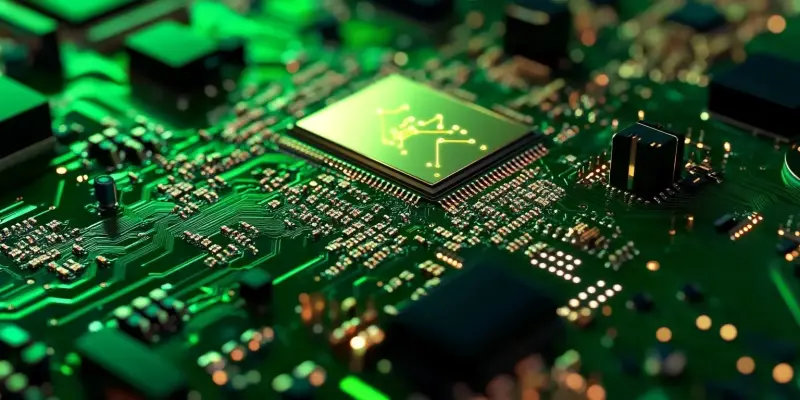The release of AMD’s Ryzen AI Max chips marks a significant milestone in the company’s pursuit of advancing integrated chip technology. AMD’s latest innovations are a direct response to the growing demand for improved overall performance, which has been significantly influenced by Apple’s groundbreaking approach with its Silicon M series chips. By focusing on the integration of CPU, GPU, and unified memory, AMD seeks to challenge the market dominance established by Apple’s solutions. Even though AMD denies that the idea of combining CPU, GPU, and memory into a single package came from Apple, it acknowledges the transformative impact that Apple Silicon has had since its launch in 2020.
AMD’s Ryzen AI Max Development
Integration of High-Performance Components
AMD’s development of its Ryzen AI Max chips has set a new standard for high-performance computing. These chips, boasting up to 16 CPU cores, 50 GPU cores, and a remarkable 128GB of unified memory, demonstrate AMD’s commitment to pushing the boundaries of what integrated systems can achieve. The company claims that these chips can render 3D graphics more than twice as fast as Intel’s Core Ultra 9 288V, setting a new benchmark for speed and efficiency. This level of integration offers users an unprecedented experience, blending computational and graphical power seamlessly.
The influence of Apple’s integrated solutions is evident in this approach. By proving that integrated solutions can meet user demands more effectively than discrete components, Apple paved the way for competitors like AMD to adopt similar strategies. AMD’s Vice President Joe Macri explains that Apple’s successful transition to integrated silicon provided the validation needed to pursue an extensive project like the Ryzen AI Max. This strategic move not only caters to the evolving needs of users but also represents AMD’s ambition to redefine performance standards in the industry.
Competitive Landscape and Strategic Intent
Although AMD maintains that it was already working on integrating CPUs and GPUs before Apple’s Silicon chips entered the scene, the broader acceptance of integrated systems can be attributed to Apple’s success. This shift has driven both AMD and Intel to reconsider and revamp their product strategies. AMD’s Ryzen AI Max is designed to compete head-to-head with Apple’s M4 and M4 Pro chips, both of which have set high standards in compact and efficient performance. By focusing on integration, AMD aims to deliver comparable, if not superior, performance within a similar compact footprint.
AMD’s strategy emphasizes the importance of meeting contemporary performance expectations while ensuring efficient energy consumption and overall system optimization. This competitive spirit drives continued innovation, opening possibilities for future developments in integrated chip technology. AMD’s commitment to evolving with market trends underscores its strategic focus, illustrating the company’s dedication to balance between technological advancements and corresponding user demands.
Industry Trends and Implications
Shift Towards Integration
In recent years, the technology industry has witnessed a significant shift towards integrated solutions, driven largely by Apple’s success with its custom silicon. Apple’s introduction of the Silicon M series in 2020 demonstrated that high performance could be achieved without relying on separate graphics units, effectively setting the trend for other industry players. AMD’s Ryzen AI Max chips are a testament to this movement, showcasing the company’s alignment with this industry-wide shift. This trend emphasizes the importance of optimizing user satisfaction by providing high-performance integrated systems rather than focusing on individual component specifications.
The move towards integration represents a broader shift in the industry, highlighting the need for efficiency, compact design, and increased performance. This paradigm shift has prompted companies to adopt a holistic approach to chip design, combining various components to create a more cohesive and powerful unit. AMD’s investment in the Ryzen AI Max project reflects its recognition of this trend and its commitment to staying at the forefront of technological advancements.
Future Prospects and Strategic Positioning
The release of AMD’s Ryzen AI Max chips represents a pivotal moment in the company’s efforts to advance integrated chip technology. AMD’s latest innovations respond to the increasing demand for superior performance, influenced significantly by Apple’s revolutionary Silicon M series chips. By emphasizing the integration of CPU, GPU, and unified memory into a single package, AMD aims to contest the market dominance that Apple’s solutions have established. Though AMD denies that the concept of combining CPU, GPU, and memory originated from Apple, it cannot ignore the transformative impact Apple Silicon has had since its debut in 2020. This competitive drive underscores AMD’s ambition to enhance its offerings and provide cutting-edge solutions that meet evolving consumer needs. The Ryzen AI Max chips not only signify technological progress but also reflect AMD’s commitment to pushing the boundaries of what integrated chips can achieve, thereby positioning itself as a formidable contender in the rapidly evolving tech landscape.

